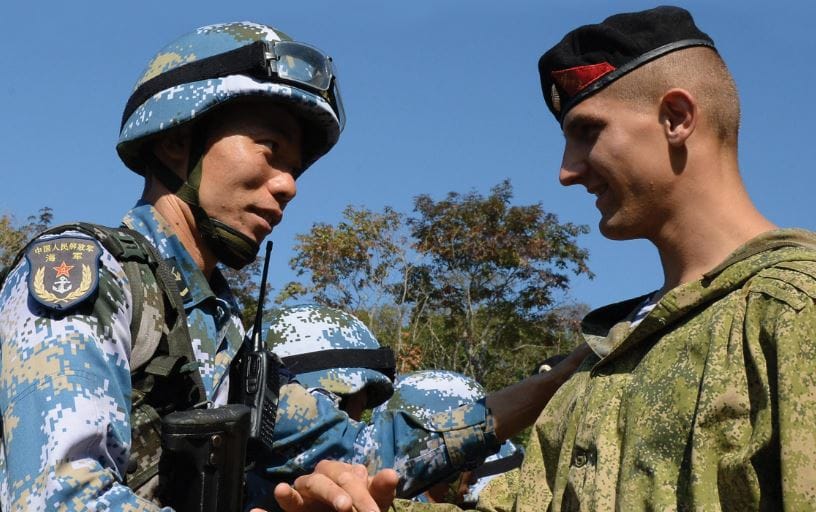Strategic Naval Drills Heighten Global Tensions
Joint Military Exercises: A Show of Strength
China and Russia’s naval forces have embarked on a significant joint exercise at a military port in southern China, commencing on July 14, 2024. This strategic move, reported by Xinhua, comes mere days after NATO allies branded Beijing a “decisive enabler” of the Ukraine conflict. The drills, held in Guangdong province, aim to display the combined might of the two nations’ navies in addressing global and regional security threats.
The Chinese defense ministry emphasized that the joint operation, which has recently patrolled the western and northern Pacific Ocean, is unrelated to current international and regional situations and is not directed against any third party. Despite these assurances, the timing of the exercise underscores the deepening military cooperation between China and Russia, which has drawn the ire of NATO members.
The Scope and Scale of the Drills
The joint naval exercise, set to run until mid-July, involves a series of complex maneuvers, including anti-missile exercises, sea strikes, and air defense operations. The drills began with on-map military simulations and tactical coordination exercises, demonstrating a high level of collaboration and strategic planning between the two naval forces.
The Chinese and Russian navies are showcasing their capabilities to handle a variety of security threats, signaling their readiness to preserve peace and stability both regionally and globally. This display of military prowess is a clear message to the international community about their united front and military preparedness.
NATO’s Response and Rising Tensions
NATO’s Stance on China and Russia
The joint naval drills follow closely on the heels of heightened tensions between NATO and China. At the recent NATO summit in Washington, the 32-member alliance issued a stern communiqué, highlighting China’s growing role in supporting Russia’s actions in Ukraine. NATO’s declaration of Beijing as a “decisive enabler” of the war against Ukraine marks a significant shift in the alliance’s focus towards China as a key security concern.
NATO’s increased attention on China and its Indo-Pacific partners reflects shared security apprehensions arising from Russia’s alliances in the region. This geopolitical shift underscores the strategic realignment of military priorities among NATO members.
China’s Rebuttal to NATO Accusations
In response to NATO’s accusations, China vehemently rejected the label of “enabler” and accused the alliance of seeking security at the expense of others. The Chinese foreign ministry urged NATO not to export its chaos to Asia, maintaining that China holds a fair and objective stance on the Ukraine conflict.
China’s sharp rebuttal to NATO’s communiqué highlights the deepening rift between the Western military alliance and the Asian superpower. This escalating war of words adds another layer of complexity to the already tense geopolitical landscape.
Implications for Global Security
Regional and Global Repercussions
The joint naval drills by China and Russia are likely to have significant repercussions on global security dynamics. The show of strength serves as a stark reminder of the growing military cooperation between the two nations, which poses a direct challenge to the strategic interests of NATO and its allies.
The drills also come in the wake of an incident involving a U.S. Coast Guard cutter, which encountered several Chinese military ships in international waters within the U.S. exclusive economic zone in the Bering Sea. This encounter underscores the increasing assertiveness of Chinese naval operations in regions of strategic interest to the United States.
Future of Sino-Russian Military Collaboration
The deepening military collaboration between China and Russia signals a strategic alliance that could reshape global power structures. This partnership, forged through shared geopolitical interests and mutual opposition to Western dominance, represents a formidable challenge to the established international order.
As China and Russia continue to strengthen their military ties, the implications for global security and geopolitical stability are profound. The international community will be closely watching the developments and responses from major global powers.
Summary
China and Russia have commenced joint naval drills in southern China, heightening tensions with NATO. The exercises, which involve complex maneuvers, come days after NATO labeled Beijing a “decisive enabler” of the Ukraine conflict. This strategic display of military cooperation underscores the deepening alliance between China and Russia and has significant implications for global security dynamics.
Key Learning Points
| Key Learning Points | Details |
|---|---|
| Joint Naval Exercises | China and Russia’s naval forces commence joint drills in southern China |
| NATO’s Accusations | NATO labels Beijing a “decisive enabler” of the Ukraine conflict |
| Chinese Rebuttal | China rejects NATO’s accusations, accuses alliance of seeking security at others’ expense |
| Global Security Implications | The drills signal a deepening military alliance and challenge to NATO’s strategic interests |
| Regional Encounters | U.S. Coast Guard cutter encounters Chinese military ships in the Bering Sea |
Soumya Smruti Sahoo is a seasoned journalist with extensive experience in both international and Indian news writing. With a sharp analytical mind and a dedication to uncovering the truth, Soumya has built a reputation for delivering in-depth, well-researched articles that provide readers with a clear understanding of complex global and domestic issues. Her work reflects a deep commitment to journalistic integrity, making her a trusted source for accurate and insightful news coverage.



